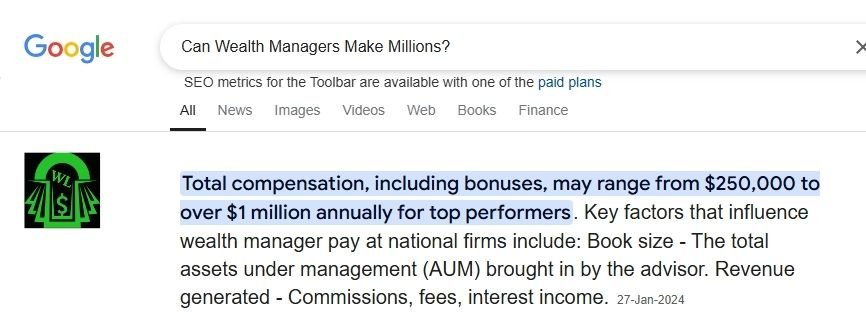

How Do Wealth Managers Earn So Much Money?
Yes, wealth managers can make millions, but it’s not a guarantee. Their earnings depend on factors like experience, client base, performance, and compensation structure.
Wealth management is often seen as one of the most lucrative professions for those with the expertise, client network, and dedication to excel.
Wealth managers work with high-net-worth individuals (HNWIs) and ultra-high-net-worth individuals (UHNWIs), providing them with personalized financial solutions.
With the rising number of affluent individuals globally, opportunities in wealth management have expanded.
According to the Capgemini World Wealth Report 2023, the global HNWI population increased by 5.2%, presenting immense potential for wealth managers to grow their portfolios and earnings.
By managing large client assets and delivering value-added services, top wealth managers can earn millions annually.
This article will also answer important questions like:
- What do wealth managers do?
- How much do top wealth managers earn?
- What are the factors that determine a wealth manager’s income?
Let’s dive in to explore the lucrative world of wealth management.


What Do Wealth Managers Do?
Wealth managers are financial advisors specializing in managing and growing their clients’ wealth through a range of services.
Their primary responsibilities include investment management, tax planning, estate planning, retirement planning, and risk management.
For example, a wealth manager might create a $10 million investment portfolio for a UHNWI, ensuring diversification to achieve an 8% annual return.
They also help clients save significant amounts in taxes by identifying deductions and credits.
Estate planning ensures that a $50 million estate is transferred efficiently to heirs, while retirement planning secures future financial stability.
Additionally, wealth managers often assist clients in mitigating risks by recommending appropriate insurance and asset protection strategies.
Their role is dynamic, requiring strong analytical, interpersonal, and strategic skills.
They provide tailored financial services, including:
- Investment Management: Creating diversified portfolios to grow wealth.
- Tax Planning: Minimizing tax liabilities through efficient strategies.
- Estate Planning: Ensuring wealth is transferred efficiently to future generations.
- Retirement Planning: Helping clients secure their financial future.
- Risk Management: Protecting assets through insurance and other tools.
How Much Can Wealth Managers Earn? Breaking Down Salary Potential
Entry-Level Wealth Managers: Building Foundations
Entry-level wealth managers typically earn between $50,000 and $100,000 annually, with bonuses ranging from 10% to 20%.
For instance, a beginner with a $75,000 base salary could receive an additional $10,000 in performance bonuses. At this stage, the focus is on learning the ropes, acquiring new clients, and building expertise.
These managers often work under the guidance of senior professionals while contributing to portfolio management and client service tasks.
Mid-Level Wealth Managers: Gaining Momentum
Wealth managers with 5–10 years of experience see their earnings grow significantly, ranging from $100,000 to $250,000 annually.
Bonuses and commissions may equal or exceed their base salary, reflecting their performance and portfolio growth.
A manager handling $50 million in assets with a 1% management fee generates $500,000 in fees annually, a portion of which contributes to their income.
This level demands deeper client relationships and the ability to independently manage portfolios.
Top Wealth Managers: Achieving Financial Peaks
Top-tier wealth managers earn from $500,000 to several million dollars annually, primarily by managing substantial portfolios and attracting affluent clients.
For example, a manager overseeing $200 million in assets at a 1% fee earns $2 million annually, excluding performance bonuses.
Many top wealth managers also become partners in firms or establish their own practices, leveraging entrepreneurial skills to maximize earnings.
The Million-Dollar Question: How Do Wealth Managers Make Millions?
The ability to earn millions as a wealth manager hinges on managing large portfolios, delivering exceptional performance, and offering premium services.
For instance, a wealth manager with $300 million in assets under management (AUM) can generate $3 million annually from a 1% management fee.
Beyond this, managers earn performance bonuses by surpassing investment benchmarks, such as achieving a 12% annual return when the target is 8%. Many also charge additional fees for services like estate planning and tax optimization.
Expanding service offerings to include ESG investments or philanthropic advising further boosts revenue.
Successful wealth managers also prioritize networking, leveraging their connections to attract high-value clients and secure referrals that help them grow their practice exponentially.
Here’s a breakdown of the key factors that contribute to their high earnings:
1. Compensation Structure: How Wealth Managers Get Paid
Wealth managers typically earn income through multiple streams, which can add up to millions for top performers. Here’s how their compensation works:
Fee-Based Earnings: Most wealth managers charge a percentage of the assets they manage (e.g., 1% of AUM). For example, managing 100millionata1100millionata11 million annually.
Performance Bonuses: Many wealth managers receive bonuses for delivering strong returns or bringing in new clients.
Commissions: Selling financial products like insurance, mutual funds, or annuities can provide additional income.
Salary + Bonuses: Those working for large firms often receive a base salary plus performance-based incentives.
2. Working with High-Net-Worth Clients
The size of a wealth manager’s client base plays a significant role in their earnings.
Managing portfolios for high-net-worth individuals (HNWIs) or ultra-high-net-worth clients can lead to substantial income.
For instance, managing 500millionata1500millionata15 million annually.
3. Experience and Reputation Matter
Wealth managers with a proven track record of success often earn more. Here’s why:
Established Track Record: Delivering consistent returns or managing large portfolios can justify higher fees.
Networking and Referrals: Building a strong reputation and client network can lead to more business and higher earnings.
4. Firm Size and Location
Where a wealth manager works can significantly impact their earning potential:
Top Financial Firms: Working for prestigious firms like Goldman Sachs, Morgan Stanley, or private wealth management divisions often provides access to wealthier clients and higher compensation.
Geographic Location: Wealth managers in financial hubs like New York, London, or Hong Kong tend to earn more due to the concentration of high-net-worth individuals.
5. Starting Your Own Wealth Management Firm
Some wealth managers choose to start their own firms, which can significantly increase their earnings.
By running their own practice, they keep a larger share of the fees.
For example, a wealth manager managing 1billionata11billionata110 million annually.
6. Performance-Based Success
Wealth managers who consistently outperform market benchmarks or specialize in niche markets (e.g., tech entrepreneurs, athletes) can attract more clients and justify higher fees.
What Factors Influence a Wealth Manager’s Income? Key Drivers of Success
1. High-Value Client Base
A wealth manager’s income is directly linked to their client base. Serving HNWIs and UHNWIs generates higher fees than working with smaller clients.
For instance, managing ten clients with $10 million each yields more revenue than handling 100 clients with $100,000 portfolios. Building relationships with affluent individuals is thus critical.
2. Exceptional Performance
Strong portfolio performance is essential for client retention and referrals. A wealth manager achieving a 10% annual return on a $50 million portfolio not only builds trust but also attracts additional clients. Performance bonuses tied to exceeding benchmarks further enhance earnings.
3. Strategic Location
Location significantly impacts a wealth manager’s income. Cities like New York, London, and Hong Kong—global financial hubs—house the highest concentration of UHNWIs.
According to Wealth-X, 62% of the global UHNWI population resides in these cities, offering greater opportunities for wealth managers to earn high fees.
4. Firm Type and Structure
Managers at boutique firms or operating independently often set higher fees than those at large institutions.
For example, boutique firms focusing on sustainable investments may charge 1.5% AUM, compared to the industry standard of 1%. Independents also enjoy greater control over their earnings.
The Role of Real Estate in Wealth Management: Unlocking Opportunities
Real estate plays a vital role in wealth management, offering stability, growth potential, and diversification.
Wealth managers often guide clients toward direct investments in high-demand areas, such as acquiring luxury apartments in growing markets like Austin or Dubai, which appreciate at 7%–10% annually.
Others recommend Real Estate Investment Trusts (REITs), which provide exposure to real estate with annual dividend yields of around 5%.
Tax-deferred exchanges, like the U.S. 1031 exchange, allow clients to reinvest real estate gains without incurring immediate tax liabilities.
For instance, a client investing $5 million in commercial properties with a 6% yield earns $300,000 annually in passive income. These strategies ensure that clients benefit from consistent returns while minimizing risks.
How Do Wealth Managers Make Millions?
1. Building a Strong Network
- Wealth managers grow their income by networking with affluent individuals and businesses. Building trust and relationships is key to attracting high-value clients.
2. Managing Large Portfolios
- Focusing on clients with significant AUM is the fastest way to earn millions. With a typical management fee of 1%, handling $200 million in assets could generate $2 million annually.
3. Offering Premium Services
- Expanding services beyond investments—such as estate planning, tax optimization, and philanthropic advising—can increase fees and revenue.
4. Leveraging Technology
- Using financial technology (fintech) tools can improve client portfolio performance, reduce costs, and streamline operations, allowing managers to scale their services.
Pros and Cons of Wealth Management as a Career
Pros
- High Income Potential: Top performers can earn millions.
- Prestige and Influence: Working with affluent clients enhances credibility.
- Flexible Career Paths: Opportunities to work in large firms or independently.
Cons
- High Pressure: Managing significant wealth comes with immense responsibility.
- Demanding Hours: Wealth managers often work long hours to meet client needs.
- Regulatory Challenges: Compliance with financial laws and regulations is complex.
Actionable Tips for Aspiring Wealth Managers
Becoming a successful wealth manager requires a combination of education, networking, and strategic decision-making.
Pursuing certifications like the CFA or CFP is crucial for establishing credibility.
Additionally, developing a niche—such as ESG investing or real estate—can attract specific high-value clients.
Networking strategically by attending industry events or joining professional associations helps build a strong client base.
Leveraging technology, like Aladdin or e-Money Advisor, improves portfolio performance and enhances client experience.
Finally, focusing on relationship building is essential, as trust and personalized service are key to retaining affluent clients.
For example, managers specializing in green energy investments attract clients passionate about sustainability, creating a competitive edge.
Conclusion


Hasnain Aslam is a seasoned finance blogger and digital marketing strategist with a strong expertise in SEO, content marketing, and business growth strategies. With years of experience helping entrepreneurs and businesses boost their online presence and maximize organic traffic, he specializes in crafting high-impact content that ranks on search engines and drives real results. His insights empower professionals to build sustainable digital success through strategic marketing and innovative SEO techniques.


